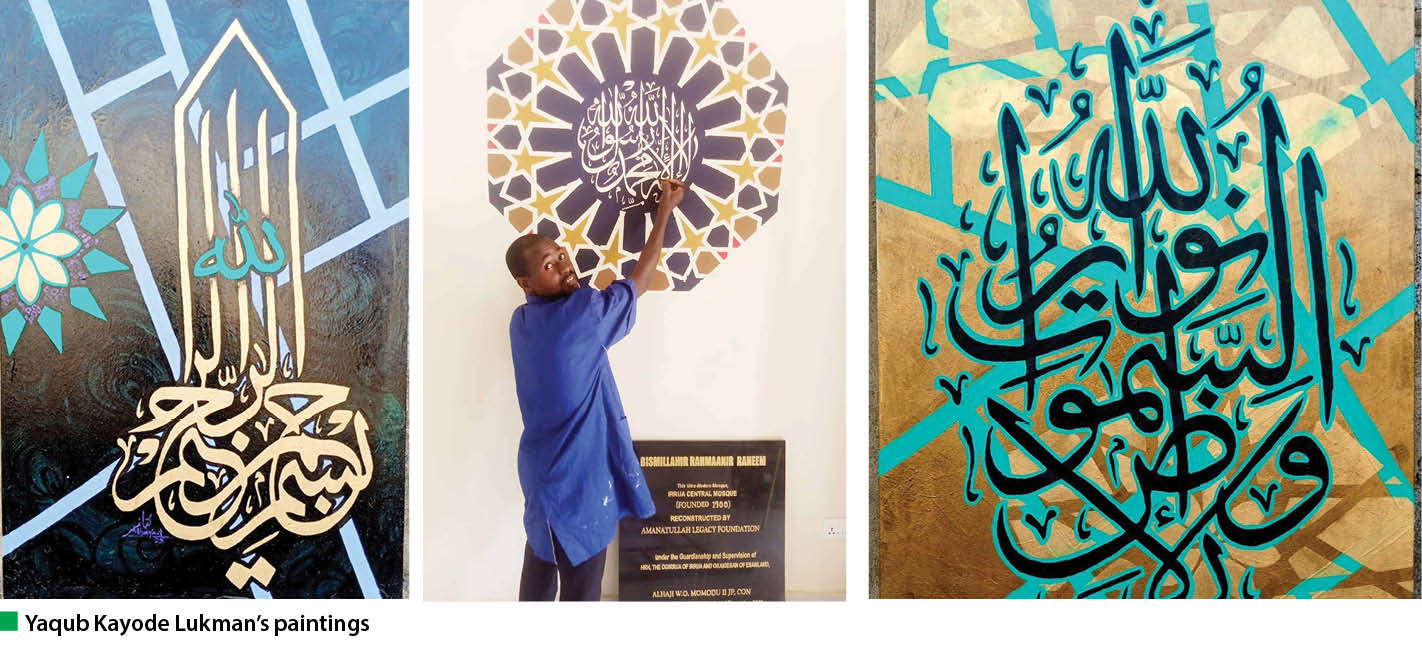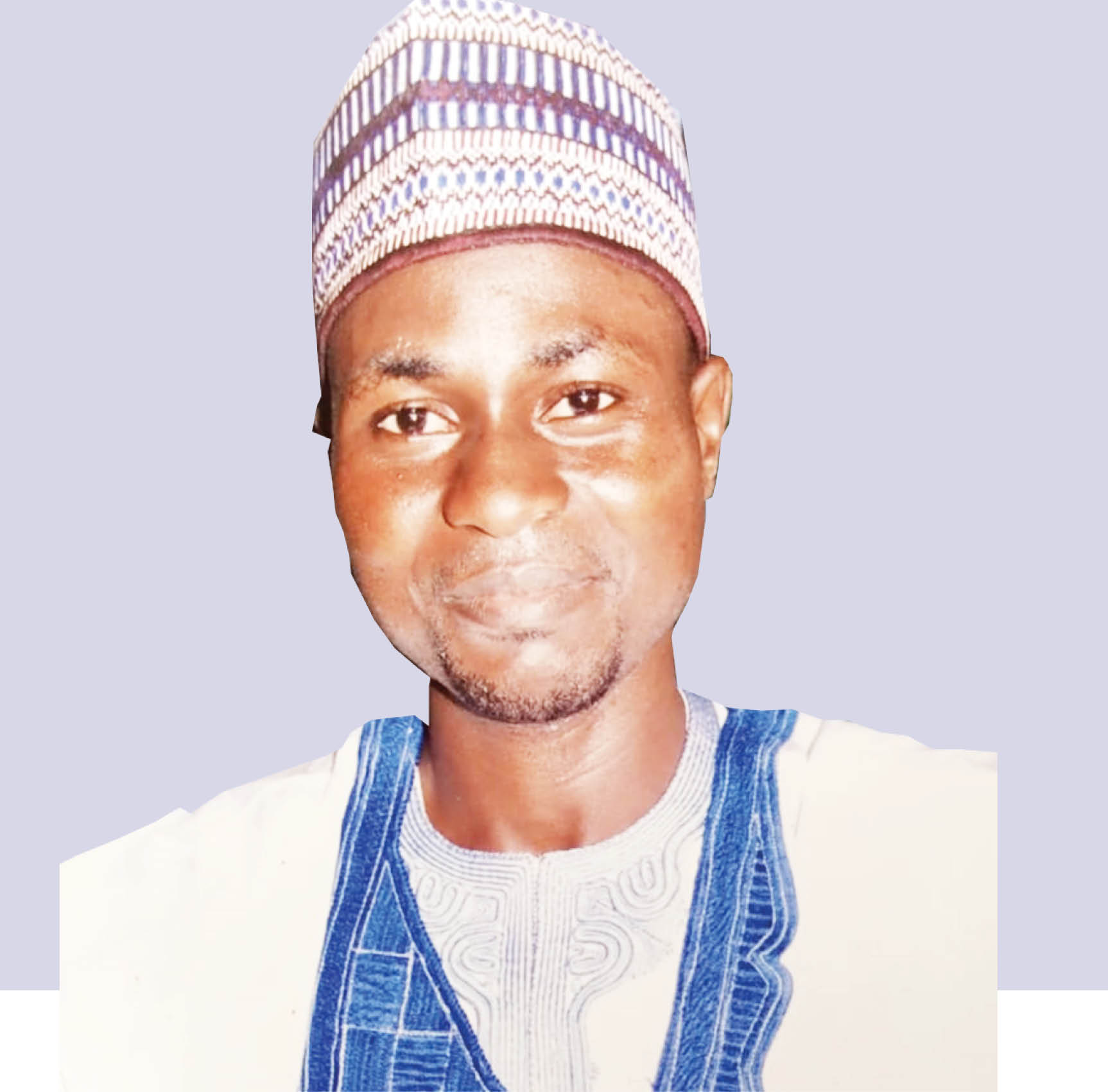Yaqub Kayode Lukman is an Abuja- based visual artist, educator, Islamic calligrapher and mural artist. In this interview, he chronicled his journey and thoughts.
Would you say you were born an artist or made one?
To be honest, I will say I am both. This is because I had an interest in art starting from my early primary school days. I had flare for drawing and painting, and I am grateful that I had the opportunity to meet good art teachers and mentors that have guided me in my career so far.
How long have you been an artist?
I have been living and practising art since 2014. I have been involved in teaching and mentoring young minds to learn and showcase their talents in art and serve as a campaigner of art therapy through art in medicine followership. I have also participated in several art exhibitions and workshops, among which are Landscapes and Forms (2011), AFAS Exhibition (2011, 2012 and 2013), African Arts and Crafts (AFAC Expo 2013), Arts and Calligraphy International Exhibition (February 2018) and International Batik Workshop (April 2018), Islamic Art Exhibition (COVID-19: Artistic Expressions of Artist’s Impressions July 30-August 6, 2020.
I am also a committed member of the following associations: ICICE/IACC Community of Muslim Artist, Society of Nigerian Artist (SNA FCT), The Creative Minds, Artists in Medicine Followership for Professionals in Arts and Health Care and AVATAN, Federal Capital Territory (FCT), Abuja.
EMOWAA launches engine room for creative partnership
‘Black is Beautiful’ movement photographer, Kwame Brathwaite passes at 85
What inspires you to create art?
Generally, art is a universal language of self-expression of feeling, thought and ideas, so as an artist, I make my art to answer a call and fill up an opening in African modern art. From my undergraduate (B.A Fine Art) degree in the Ahmadu Bello University, Zaria, I have carefully followed a path to make modern Islamic and Arabic calligraphy art, which is a path I do not see many on.

Do you think your perspective of the world is different from that of a non-artist?
Yes, I see the world differently. Seeing the word differently is a fundamental skill every artist must have. Where others may see chaos, I may see beauty. What may bring tears to the eyes of another person may bring laughter to an artist. So as a visual artist and art educator, I always ensure that my observation skills are strong, to the extent of creating things out of nothing and also be able to give a different perspective on life and other issues.
What do you enjoy most about being an artist?
What l like most is the freedom of expression I enjoy while making my artwork. This freedom is what gives me inspiration, allows me to create art that pushes my potential and keeps me going in my career.
As an artist, what are the things that make you happy?
I have many reasons to be happy, but I think my most joyful moment is when I see and meet people who appreciate my works, and not only stop there but also purchase them and use it to decorate their walls.
Do you think art serves a purpose in the society?
Yes, it does. The purpose of art in the society is obvious in every sphere of the society, which includes using art as decorations, educational purposes, cultural identification, religious/belief purposes, for therapeutic purposes (curing mental illness) and many more.
How deep is the bond between you and artwork?
The bond between me and my artworks run deep. This is mainly because all my artworks are parts of my experience, time, resources and my creativity put together. Sometimes I see it as if I had given birth to a new me that would outlive my physical being.
Which is more important to you: the end result, process or both?
The end result and the process are very important to me because a good art piece requires planning, which is seen in the amount of efforts, time and energy used to conceive a concept and make it into reality. That is, it involved slot of planning, engaging in colour selection, which spur sparkling, amazing and creative work of arts.
How do you improve on your skills?
As an artist, I have been making research and reading relevant books that will help to enhance my knowledge in the field, go to exhibition to see what other artists are doing, pay visit to master studio, Attend seminar, workshop and art galleries.
Are your paintings planned or you are spontaneous with ideas?
Most times I have to plan my paintings because I want to be correct and on point with the concept and ideas I want to pass to my audience.
What colour is your favourite and why?
Sky blue has to be my favourite colour because it keeps me calm, relax my nerves and gives me inspiration to make beautiful artwork.
What is your ideal working environment?
That will have to be my studio. It is my comfort zone; and I would rather be there than anywhere else, plus the best time to get any work done is early in the mornings till noon.
If you could advise your younger self, what would you say?
Looking back the memory lane, I would have loved to learn other forms of art, which would have made me a versatile artist.
What is the average time for you to complete a painting?
I would say that 2hours is enough if I am really in the mood and the concept I am working on is not complex. But some days it could definitely take more time.
What is your preferred medium; and why that choice of style?
My preferred medium for working is acrylic paint, but over the years I have experimented oil paint, enamel, and other technique to produce my artworks.
My choice of style was developed during my undergraduate days, where I experimented with Piet Monderian philosophy of art, called Neo- plasticism, which was rooted in his believe that the knowledge of God is achievable through intuition and meditation. Under the guidance of this philosophy, painting became a devotional experience for him and other artists. My experiment of fusing Arabic calligraphy into neo-plastic form of art has led me to specialise in Islamic painting and has been my major form of art over the years.
What is your favourite artwork and the story behind it?
My favourite work is titled, “Al- khlas.” This painting reminds me of the COVID -19 era when the world came to a standstill due to the viruses and everyone was scared of going out. While all these were going on, we realised that turning back to Allah in repentance and ask for forgiveness and seek his guidance toward getting solutions to the problem was the only option.
How do you fix prices for your works; and what’s the most expensive art you have sold?
I find this question interesting. This is the most difficult for me because of the attached love I have with my works, but as an undergraduate we were taught some principles that guides me to value my paintings. They are concept presentation and rendition, medium used and size of the work, cost of materials, time spent and creative input. Any time I am putting a price tag a piece of art I follow those principles in order to give value to my painting. My most expensive painting I ever sold in an exhibition was N250,000.
Would you say art exhibitions in Nigeria are effective enough to build a stronger community in Nigeria?
Art exhibitions have helped many artists to showcase works to the general public over the years and have also built a stronger bond between the artist and the art community, which includes the art collector, buyer and marketer. But having said that, the Nigeria community of visual artist still needs more enabling environment to market our artworks and more established gallery for displaying our works during and after exhibition. This will also assist and keep the artist in business, which in turn brings more revenue for the artist and the government.

 Join Daily Trust WhatsApp Community For Quick Access To News and Happenings Around You.
Join Daily Trust WhatsApp Community For Quick Access To News and Happenings Around You.

